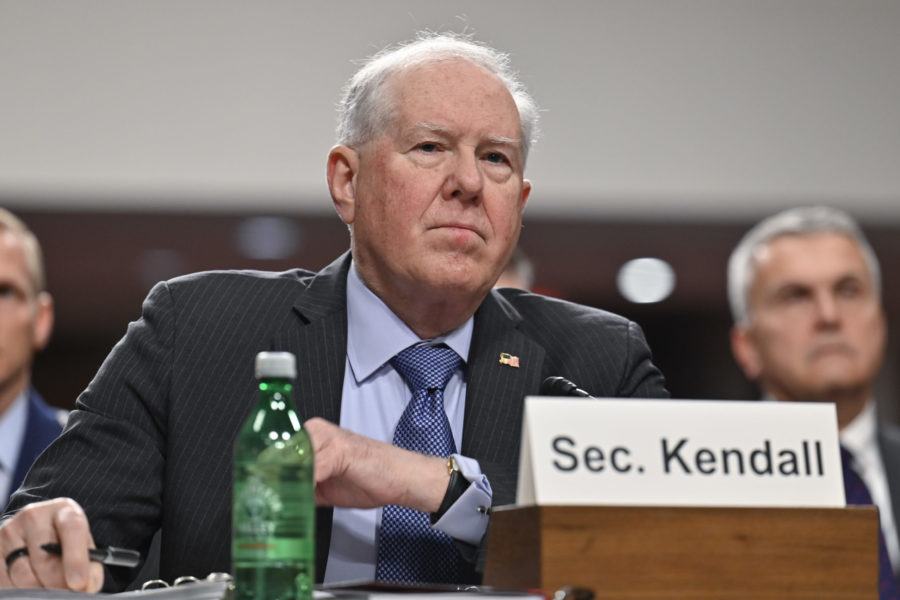Air Force Secretary Frank Kendall is fond of saying his top three priorities are “China, China, and China.” When it comes to what he wants Airmen and Guardians to read about, his answer is no different.
The new SECAF Reading List, subtitled “Understanding Our Pacing Challenge,” consists of 19 selections—every one of them focused on China.
Referencing his own Cold War experience, in which “I learned firsthand the importance of deepening one’s understanding of potential competitors,” Kendall explained the value of knowing one’s adversary. “By closely studying the Soviet Union, we were able to better appreciate motivations, strategic intent, operational methods, and tactics,” Kendall said. “This, in turn, helped us better prepare for and prevent conflict. Our ability to anticipate and counter Soviet actions helped us to deter effectively and ultimately led to the collapse of the Soviet Union.”
The Soviet Union is a distant memory, but the People’s Republic of China is America’s new pacing threat. “The PRC’s rapid modernization of its military and increasingly assertive behavior in the Indo-Pacific region poses a significant challenge to U.S. national interests, the security of the homeland, and regional stability,” Kendall wrote. “There is no time to lose in responding to this challenge. Studying and better understanding China is a prerequisite to making sound decisions about how to best deter, and, if necessary, defeat our pacing challenge.”
Shortly after taking the job as Air Force Secretary, Kendall made that very point in an interview with Air & Space Forces Magazine. “I spent the first 20 years of my career in the Cold War working on some of the types of issues that we’re actually confronted with now: a peer competitor who is acting very aggressively to try to defeat us, and responding to that.”
Kendall’s reading list breaks China down into five categories: history; the contemporary state; military modernization; geopolitical competition; and regional relationships. Authors range from Cold War icon Henry Kissinger, a former National Security Advisor and Secretary of State, to renowned China expert David Shambaugh and Pulitzer Prize-winning historian Barbara W. Tuchman.
The full list includes:
- “On China” by Henry Kissinger
- “The Search for Modern China” by Jonathan D. Spence
- “The Rise and Fall of Imperial China” by Yuhua Wang
- “Stilwell and the American Experience in China, 1911-1945″ by Barbara W. Tuchman
- “The World According to China” by Elizabeth C. Economy
- “The Avoidable War” by Kevin Rudd
- “China’s New Red Guards: The Return of Radicalism and the Rebirth of Mao Zedong” by Jude D. Blanchette
- “The People’s Republic of Amnesia: Tiananmen Revisited” by Louisa Lim
- “The Party: The Secret World of China’s Communist Rulers” by Richard McGregor
- “Active Defense: China’s Military Strategy Since 1949” by M. Taylor Fravel
- “Fire on the Water: China, America, and the Future of the Pacific” by Robert Haddick
- “The Long Game: China’s Grand Strategy to Displace American Order” by Rush Doshi
- “The Hundred-Year Marathon: China’s Secret Strategy to Replace America as the Global Superpower” by Michael Pillsbury
- “The Third Revolution: Xi Jinping and the New Chinese State” by Elizabeth C. Economy
- “China’s Quest for Great Power: Ships, Oil, and Foreign Policy” by Bernard D. Cole
- “Where Great Powers Meet: America and China in Southeast Asia” by David Shambaugh
- “The Elephant and the Dragon” by Robyn Meredith
- “The Future Is Asian” by Parag Khanna
- “The Trouble with Taiwan: History, the United States, and a Rising China” by Kerry Brown and Kalley Wu Tzu Hui
Air Force Chief of Staff Gen. Charles Q. Brown Jr. and Chief Master Sergeant of the Air Force JoAnne S. Bass have previously published their own “Leadership Libraries.” These selections, featuring books, films, and podcasts, cover a wider range of topics for Airmen to consider. Kendall’s list is the first to focus exclusively on a single competitor.
